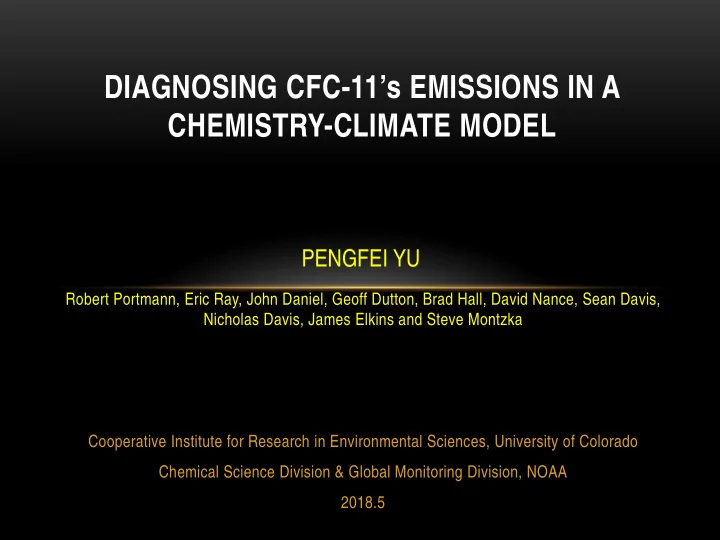

DIAGNOSING CFC-11’s EMISSIONS IN A CHEMISTRY-CLIMATE MODEL PENGFEI YU Robert Portmann, Eric Ray, John Daniel, Geoff Dutton, Brad Hall, David Nance, Sean Davis, Nicholas Davis, James Elkins and Steve Montzka Cooperative Institute for Research in Environmental Sciences, University of Colorado Chemical Science Division & Global Monitoring Division, NOAA 2018.5
Use NSF/DOE Climate Model CESM to revisit the emission from the 3-Box model Emission Meteorology: a Wind & temp 100 3-Box Model Emission of CFC-11 90 Emission or Production (Gg/yr) Emission or Production (Gg/yr) 80 MERRA2 13 ± 5 Gg/yr 70 (25%) increase 60 MERRA1 50 40 30 GEOS5 20 Reported 10 Production Montzka et al. 2018 0 1995 2000 2005 2010 2015 Climate Chemistry Models (CCM) CAM5 WACCM
HOW RELIABLE IS 3-BOX MODEL EMISSION? Emission increase seems too large after 2012 0.0% CFC-11 -0.2% rate of change (per year) Rate of Change (per year) Global concentration -0.4% Observed -0.6% -0.8% -1.0% Climate model using 3-Box model Emission 3-D Models: WACCM or CAM, -1.2% Reanalysis met.: 2000 2005 2010 2015 MERRA, MERRA2 Year or GEOS5
HOW WE DERIVE EMISSION? CFC-11’s MASS BUDGET LOSS Stratosphere Stratosphere to troposphere exchange, STE Total Atmosphere Budget: Troposphere Growth = Emission - LOSS Emission South North
EMISSION, LOSS AND GROWTH RATE IN A 3-BOX MODEL Budget Eq. Emission = Growth - Loss 3-Box Model Emission Rate Growth Rate Loss is assumed constant Loss Rate in a 3-box model
LIFETIME VARIABILITY IS MOSTLY DRIVEN BY DYNAMICS LOSS Bonisch et al., 2001, ACP
THE LIFETIME OF CFC-11 IS NOT CONSTANT IN A CCM BECAUSE OF VARYING DYNAMICS Budget Eq. Emission = Growth - Loss Life time changes Loss Term Changes
CAN WE QUANTIFY THE INFLUENCE OF DYNAMICS ON OBSERVED TRENDS AND DERIVED EMISSIONS? LOSS Stratosphere Stratosphere to troposphere exchange, STE Total Atmosphere Budget: Tropospheric Budget of F11: Troposphere Growth = Emission - LOSS Growth = Emission + STE Emission South North
Is dynamical variability (STE) derived in a CCM realistic? From Model Solid: STE Anomaly of F11 from CCM % per year, STE
STE CFC-11 vs. QBO: strong correlation From Model 20 Solid: STE anomaly of F11 from CCM Dashed: QBO, 60 mb Singapore wind anomaly % per year, STE m/s, QBO R 2 =0.5 -20
SURFACE OBSERVATIONS ALSO SHOWS CORRELATION WITH QBO AND MODELED F11 Solid: STE anomaly of F11 Term from CCM Solid: STE of F11 Term from CCM 20 Dashed: QBO, 60 mb Singapore wind anomaly Dashed: QBO, 60mb winds STE anomaly of F11 term from NOAA, SH mean STE of F11 term from NOAA, SH mean STE anomaly of F11 term from NOAA, Global % per year, STE m/s, QBO INDICATION: Stratospheric Dynamics (e.g. QBO) might be diagnosed and monitored by Surface Measurements ! To diagnose Stratospheric dynamics, require year-to-year variation at ~0.1% level from measurements -20
ESTIMATE CORRECTED EMISSION Observed CFC-11 Growth Rate CCM STE of CFC-11, two model estimates CCM OBS Emission = Growth - STE
CORRECTED INFERRED EMISSIONS Year 2017 projected 3-Box model CFC-11 Emission CCM Corrected Emission CCM Corrected Emission increase is about 40% lower than the 3-Box model: 2013 to 2016
MODEL PUZZLES • Nudging Methods change modeled dynamics significantly (lifetime changes by 10%), why? • Dynamics affects global growth rate, but not Hemispheric difference? Wind only nudged Wind and Temperature nudged
SUMMARY • An increase in CFC-11 emission is required for a Climate Model to reproduce the slowdown of CFC-11’s decline (Montzka et al., 2018, Nature ) • Climate model suggests dynamical effects (e.g. QBO) are aliased into the emission derived by the 3-Box model. • The CCM corrected CFC-11 emission increase since 2012 is about 40% lower than 3-Box. In 2017, corrected emission is higher • Stratospheric dynamical variability including QBO seem to be reflected in surface measurement records of CFC-11 • STE and emission estimates of chemicals require year-to-year variation at about 0.1% level from measurements • Model and reanalysis dataset's puzzles are revealed and need to be solved Future Work • How to identify the source regions of the “unexpected” emissions of CFC- 11?
MODEL PUZZLES • Dynamics affects global growth rate, but not Hemispheric difference, why? 2.0 0.0% 0.0% Solid Line: Changing Dynamics CFC-11 3-D model Dashed Line: Fixed Dynamics Hemispheric difference -0.2% -0.2% Growth rate (per year) 1.5 Rate of Change (per year) Rate of Change (per year) [N–S] – [N–S] 2010-12 (ppt) 3-D model -0.4% -0.4% 1.0 observed -0.6% -0.6% observed 0.5 -0.8% -0.8% 0.0 -1.0% -1.0% NO Dynamical effect? Dynamical effect -0.5 -1.2% -1.2% 2010 2012 2014 2016 2018 2000 2000 2005 2005 2010 2010 2015 2015 Year Year Year 16
STE TERMS FOR F11, F12 AND F113
OBSERVED GROWTH RATE – FITTED EMISSION
Recommend
More recommend